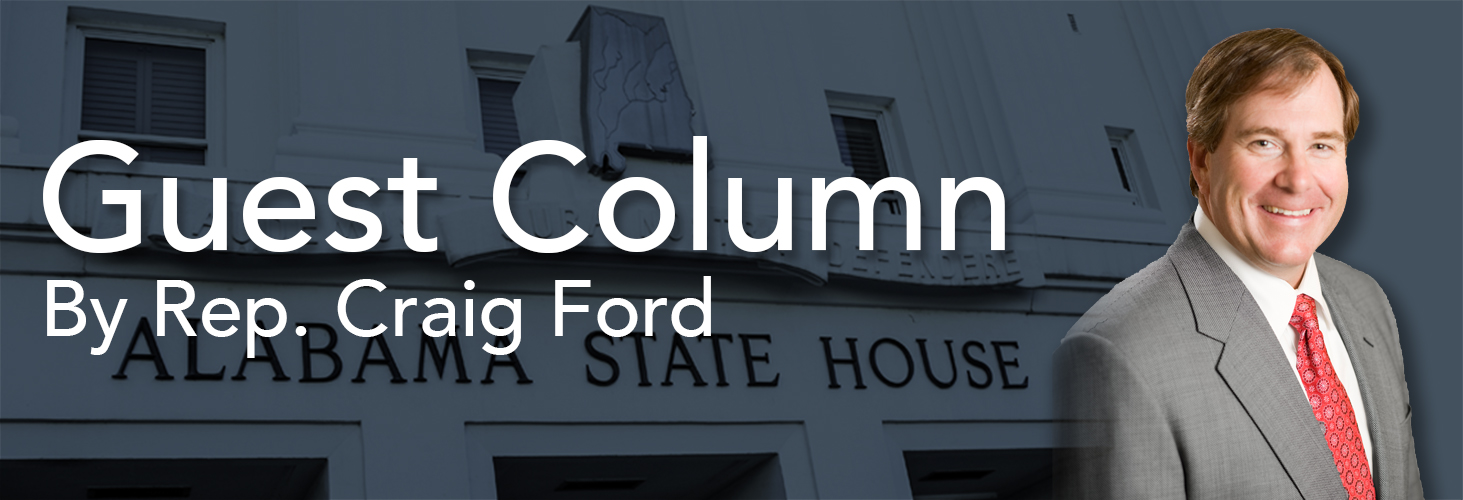By Rep. Craig Ford
The legislative session began this week and, by all accounts, it’s expected to be an uneventful year. The only goal lawmakers seem to have is to pass the budgets and go home.
But there is a lot of work that can and ought to be done instead of just kicking the can down the road for the next legislature.
Beyond the typical budget issues, there’s a lot of unfinished business involving our infrastructure, healthcare, education and jobs that we need to address – and all of these issues go hand-in-hand.
If we want to create jobs, we have to have a healthy and educated workforce. At the same time, we have to have the infrastructure that can meet the needs of the businesses we want to recruit.
Traffic congestion and roads and bridges that are in bad condition make it harder for us to recruit industry. Traffic congestion makes it difficult for employees and customers to even get in and out of the parking lots and shopping centers, while damaged roads and bridges cost businesses gas money and vehicle maintenance costs. These problems turn business leaders off and can cost us opportunities to bring new industry to our area.
That’s why I have pushed so hard – and secured a commitment from the governor – for the I-759 extension. It’s also why I continue to fight for funding to finish widening Hwy 411 connecting Etowah and Cherokee counties, and for other projects like the Southside Bridge and widening Hwy 77 in Attalla.
Education is another critical part of job creation and industrial recruitment. Businesses need to know that the local workforce has the skills needed to do the jobs they want to bring, and more and more that means workers with computer and trade skills.
There is a major deficit in our state between the need for workers who can weld or work with electrical and plumbing systems and those who actually have the skill set to do those jobs. That deficit also exists with technological and computer skills that are becoming increasingly important in today’s work environment. That’s why increasing funding for pre-k, computer and career technical programs should be one of our highest priorities in this legislative session.
Healthcare is another issue that might play a bigger role this year because of the uncertainty coming out of Washington, D.C. Even if you have private health insurance or don’t have kids, you should still care about Medicaid and the national Children’s Health Insurance Program (CHIP). Let me explain why.
It’s not just about the 83,000 kids who get their healthcare directly from the CHIP program, or the additional 70,000 who have healthcare through Medicaid but funded by CHIP. What it’s really about is their doctors and local hospitals.
If CHIP doesn’t pay for those kids, then doctors and hospitals don’t get paid. And if they don’t get paid, they can’t stay in business. That’s why we have lost 10 hospitals (mostly in rural Alabama) since 2010, and nearly lost an 11th hospital last year in the governor’s own hometown.
Doctors and hospitals going out of business affects everyone, including the majority of us who have private health insurance. And the loss of – or risk of losing – local doctors and hospitals can obviously make a community less attractive to the industries we are trying to recruit.
Similarly, addressing the opioid crisis is also important because businesses don’t want to hire people who can’t pass a drug test.
So bringing jobs and industry to Etowah, Cherokee and DeKalb Counties will require more than just tax incentives and land development. Those things are obviously important, and we do need to be smarter about the way we do them – especially the land development (What we don’t want is to waste millions upon millions of dollars on developing land and then not bringing any businesses to that location).
But we can’t rely just on tax breaks and land development. We have to offer the whole package if we want to be competitive. That means improving education and making sure our curriculum is meeting the actual needs of the businesses we are trying to bring here. It also means making sure our roads and bridges are safe, and that traffic flows smoothly. And it means that we have to have a workforce that is not only trained and motivated, but also healthy enough to do the jobs that business want to bring.
It’s tempting for legislators to simply pass the budgets and go home. But if that’s all we do this year then we won’t be doing our jobs.
Rep. Craig Ford represents Gadsden and Etowah County in the Alabama House of Representatives. He served as the House Minority Leader from 2010-2016.



















































